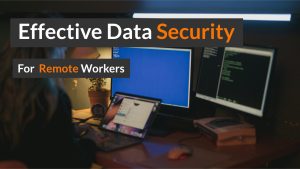Data security has been a critical concern for any business ever since for numerous reasons. A single data breach can cause major disruption to your operations with all the financial loss, reputational damage, and even noncompliance with laws you have to face. Given those, the number of data breaches continues to grow, with scams targeting small businesses.
And when the pandemic turned the world upside down, a new threat also arose. With businesses embracing the remote setup, allowing their employees to work from home, it has become more challenging for them to keep their hands on everything regarding security.
According to the 2022 Verizon Data Breach Investigations Report, 82% of all data breaches have been caused by the human element. You’re probably well aware of how difficult it is to keep your employees in check in terms of security, even if you’re all in the same building. What’s more, if you start to allow working from home?
Well, nothing to worry about, though, because this blog will help you align your data security management in this new age of remote work. Let’s get started!
Build a Comprehensive Data Security Plan
Effective data security management always starts with thorough planning. Hence, it’s essential to take your time brainstorming with the security team on how you can keep your business data safe in the work-from-home setup.
When building the plan, remember to be as concise as possible. Explain what to do before, during, and after a data breach. This strategy would help transform your company from reactive to proactive, equipping your team with proper actions on circumstances.
Nevertheless, always make sure to update it from time to time because your security needs may change over time.
Implement Cybersecurity Best Practices
After you’ve written your data security plan, make sure to implement it effectively. Below are a few cybersecurity practices that must be followed:
Software and Security Systems Update
Software companies release new versions of their programs to improve overall functionality and add extra features. Thus, keeping your software and security systems updated is always best to ensure maximum security. You can advise your employees to set automatic updates to avoid the hassle of checking for a new version every time there’s one.
Malware Protection
Malware may be the quickest way for hackers to gain access to your data. Thus, it’s crucial to secure working equipment and networks from this threat. To protect your company from malware, you may set up a firewall and invest in strong security tools, like anti-virus software.
Network Security
Your remote teams must always use a secure internet connection to protect your business data. Always advise them not to use public WiFi whenever they work and to use a wired internet connection when accessing company systems if possible. That way, you can protect yourself from hackers just waiting for the right time to attempt a breach.
Moreover, require them to use a virtual private network (VPN) to encrypt data transmissions and protect account logins. This will strengthen network security.
Data Encryption
You must always encrypt your data to protect them from intruders and threat actors. By encrypting data, you can ensure that confidential and sensitive information is kept secure and protected from unauthorised access.
Proper Data Disposal
It’s also advisable to dispose of data you longer need to lower the risks of data breaches. Because if the unused data is not destroyed properly, it can be retrieved and compromised by malicious actors, using it to their advantage. So, it would be best to train your employees about these things.
Strong Password Policy
As simple as it seems, using a strong password makes a significant difference. If your staff uses complex passwords with a letter-number combination, along with special characters, it can be difficult to guess for hackers. That way, the data your company holds and manages will remain safe.
Updating the passwords from time to time will also help. You can recommend a password manager that your employees can use to make this process easier.
Multi-Factor Authentication (MFA)
Besides having a strong password policy, it would also be a good idea to have them activate MFA. It can be anything from biometrics, phone or email verification. This will add an extra layer of security since cyber attackers usually rely on using passwords to infiltrate a system. Hence, it reduces the success of malware attacks and phishing.
Beyond that, enforcing zero trust network access (ZTNA) will further strengthen data security as it assumes that every connection is malicious until proven legitimate. In other words, anyone trying to access the network must be verified before doing a certain action. This can help keep intruders’ hands off sensitive information.
Securing Personal and Sensitive Form Submissions
Consider using encryption when collecting and storing personal and sensitive data from form submissions. Follow my guide to safeguarding form submission data with Gravity Forms and advanced encryption techniques.
Train Your Employees
Human error makes up a large percentage of data breaches. Thus, by providing security-focused employee training, you can minimise these errors.
The training must include anything from reviewing your company’s cybersecurity policy and going over the specifics of the procedures and methods they must follow. Your staff must learn top remote security tips, like spotting phishing emails, using strong network connections, and more. Having effective employee training lowers the risks of company data being compromised.
Conduct Risk Assessment
Finally, it’s essential to always perform risk assessments in the remote setup. This can help better understand their security posture, allowing them to make informed decisions when implementing security measures.
The Bottom Line
The remote setup can be a more difficult model when it comes to ensuring effective data security management. But by following our tips, you can protect all data even if you don’t work with your staff inside the same office. Hence, start prioritising data now and keep thriving in this new age of remote work.

